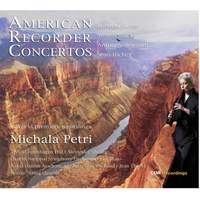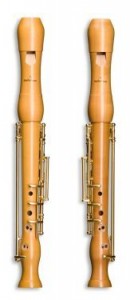Can't afford a bass recorder ...
It's possible to simulate the sound of a bass recorder with a bit of effort. This is probably not as much fun as having a real one, but it's definitely cheaper. It does require a microphone, though.
This is potentially useful if one is trying to practice with a group, and no bass recorder is available. It only works for pre-recorded bass parts, though.
The way to do it is to play the bass part on a treble recorder and record the part at the same time. This requires care to get reasonably good results.
Then import the recording into Audacity, select the whole of the recording, and then use the pitch change effect to lower the pitch by an octave - that's 12 semitones in the drop down menu. Somewhat surprisingly this works quite well, and the results do sound somewhat like a bass (basset) recorder. As a technique for getting more realistic sounds for individual parts this is better than trying to use Midi sounds with an electronic keyboard.
The point of this is that the treble recorder should have roughly the same fingering as the bass (basset) recorder. [Most notes are the same, but a few might be slightly different...]
It may be possible to use other tools than Audacity - perhaps Reaper - to get the octave pitch reduction.
It should similarly be possible to simulate the sound of a tenor recorder using a descant recorder.
I haven't tried for contra bass, or sub-contra bass effects - yet!
It's possible to simulate the sound of a bass recorder with a bit of effort. This is probably not as much fun as having a real one, but it's definitely cheaper. It does require a microphone, though.
This is potentially useful if one is trying to practice with a group, and no bass recorder is available. It only works for pre-recorded bass parts, though.
The way to do it is to play the bass part on a treble recorder and record the part at the same time. This requires care to get reasonably good results.
Then import the recording into Audacity, select the whole of the recording, and then use the pitch change effect to lower the pitch by an octave - that's 12 semitones in the drop down menu. Somewhat surprisingly this works quite well, and the results do sound somewhat like a bass (basset) recorder. As a technique for getting more realistic sounds for individual parts this is better than trying to use Midi sounds with an electronic keyboard.
The point of this is that the treble recorder should have roughly the same fingering as the bass (basset) recorder. [Most notes are the same, but a few might be slightly different...]
It may be possible to use other tools than Audacity - perhaps Reaper - to get the octave pitch reduction.
It should similarly be possible to simulate the sound of a tenor recorder using a descant recorder.
I haven't tried for contra bass, or sub-contra bass effects - yet!
 The technique is called phase vocoding, well known to anyone who's had any involvement with electronic music since the 1980s and the increased accessibility of digital signal processing in general. It involves an analysis stage, in which the original signal is represented as a function of frequency distribution over time, followed by a resynthesis stage, which can involve multiplying all the frequencies by a certain factor so as to change the pitch, or stretching/compressing in time, or both. All DAWs have more or less sophisticated algorithms for doing these things. But there's an enormous amount of online literature concerning the theory and practice of such techniques.
The technique is called phase vocoding, well known to anyone who's had any involvement with electronic music since the 1980s and the increased accessibility of digital signal processing in general. It involves an analysis stage, in which the original signal is represented as a function of frequency distribution over time, followed by a resynthesis stage, which can involve multiplying all the frequencies by a certain factor so as to change the pitch, or stretching/compressing in time, or both. All DAWs have more or less sophisticated algorithms for doing these things. But there's an enormous amount of online literature concerning the theory and practice of such techniques.





Comment